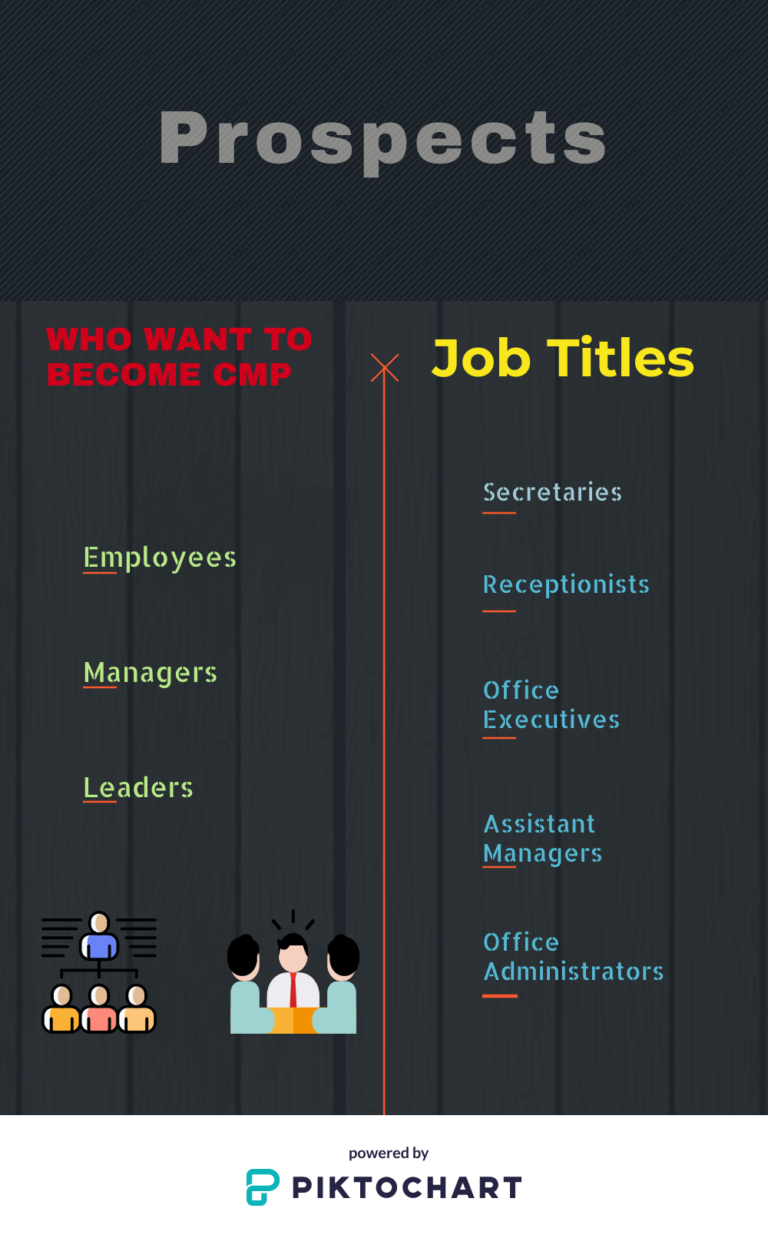Meeting Planners are one of the less noticed individuals in the corporate scenario. The modern corporate and organizational culture revolve s around constant meetings and conferences often held in external venues or even cross-country locations. In the UK this results in 1.3 million business events annually. This is made possible by meeting and event planners scoping out all the necessities. A blog post on “UK Event Industry” puts the event and conference industry at £19.9 billion in 2019.
What is CMP?
CMP stands for Certified Meeting Professional or Certificate in Meeting Planning. They are used interchangeably in the industry. The CMP designation is given by the Convention Industry Council. The body recognizes individuals with the highest standard of professionalism in managing meetings, conventions and exhibitions industries through the CMP test.
CMP: Career Overview
A certified meeting planner does exactly what the name suggests. CMP’s orchestrate successful events such as meetings, conventions, or fundraisers for businesses. A meeting planner might be employed permanently or on an event-by-event basis. Read on for specific duties and responsibilities.
CMP Vs. CMM
Certificate in Meeting Planning (CMP) is often confused with Certificate in Meeting Management. Although related, the two are not competitive or interchangeable in any way. Certificate in Meeting Management (CMM) doesn’t diminish the Certified Meeting Professional (CMP) designation at all. The CMP plays a more tactical role whereas the CMM focuses on executive decision-making and long term strategies.
Responsibilities of Certified Meeting Planner
Content
All gatherings are centred around a specific agenda. It’s the CMP’s job to determine the relevant elements that must be included depending on the type of event. For a usual event this may include choosing speakers and specialists to be showcased and highlighted. In some cases, events may require moderators, conference directors, seminar instructors and other specialists. CMPs also need to cater to attendees’ needs, including meals and mixers. Certified meeting planners also recruit support staff to run an event smoothly.
Venue
Appropriate venue that meets the needs of both presenters and attendees is the single most important factor managed by the meeting planner. Whether it’s the conference room down the hall or a large auditorium that seats a thousand people a meeting planner will be involved in making the choice. Convention centres, hotels, conference centers and similar sites. Seating capacity, location and price are the factors an experienced meeting planner will look at before selecting a venue. Other features include, food and beverage options, lodging, access to transportation, conference equipment and technical support.
Preparation
Whether a one-day meeting or a week-long convention the next thing to consider is preparation. This starts with communicating management and support staff. They make sure that all necessary props, electrical equipment and decorations are available for set up on site. A CMP will make arrangements for refreshments, lodging and transportation for all parties involved. Other preparations may include registration and information booths, and, and entertainment segments.
Finances
Certified meeting planners are also responsible for an event’s budget. This may include negotiating a favourable rate with suppliers and venue owners. Financial responsibilities can also include preparing contracts for everyone involved, including attending organizations and content providers. High-profile speakers can require a large budget and agreements made months in advance.
Supervision
Meeting planners notify clients/management teams while monitoring event updates. This involves contact with on-site staff to coordinate changes in real-time. Planners also need to review event bills and spendings to ensure smooth payment.

Getting Certified
The convention and meeting industry is a hotspot for individuals from all disciplines. It is possible for people in various backgrounds to pursue a job in this line. Consequently, it becomes hard to distinguish between real professionals and inexperienced people. Certification clears this issue once and for all. Meeting planning certificate can be obtained by anyone who is passionate about the work regardless of backgrounds. You can obtain certification in a number of ways depending on what you do and where you work or, have worked. Experience and education both can result in certification, here is how.
Experience and Education
You can experience in the field by 36 months (within the last 5 years) full time experience as a professional or educational instructor in the meeting, event, exhibition, hospitality and tourism industry
For education, you can either obtain an associates’ degree (or higher) in the tourism/event management field or, clock 25 hours of educational activities (Eg. classes, individual sessions face-to-face conferences, and webinars)in the past five years from accredited institutions.
Lastly, you may begin by logging 200 hours of internship experience from recognized employers as formal training.
Why is industry certification important?
In the Convention Industry having certification establishes two things, credibility and determination. Showing you are passionate enough about your career. Furthermore, the learning process involved in earning certification provides a solid groundwork for you to expand your career opportunities further. The truth is, certification ensures you understand the requirements and playing terms of the field to possible employers.
Essential Skills for Being a Successful Meeting Planner
Meeting planning involves managing people, resources, and venues. Each requiring a different type of organizational and communication skills. The meeting planner depends largely on the service providers for managing events for their clients. From the drawing board to the event podium, meeting planners need to have a clear idea of all the moving parts and how to react when things go according to plan. All this requires a barrage of social and professional skills, some of which are given below.
1. Composure
Event management is often a fast-paced environment and you need to be able to make quick decisions while remaining calm. In the off chance that all the preparations don’t come through a good meeting planner will manage alternatives with a composed manner.
Communication skills: Meeting planners communicate with clients, suppliers, and event staff on a daily basis. You need excellent written and oral communication skills to convey the clients needs effectively.
2. Interpersonal skills
For a meeting planner establish and maintain positive relationships with clients and suppliers for both present and future needs. Having interpersonal skills translates into ensuring the best deals you could possibly land.
3. Negotiation skills
Quality products and services at reasonable prices is what often defines a good meeting planner. In order to maintain these you must have honed negotiation skills.
4. Organizational skills
In order to provide high-quality meetings and meet tight deadlines meeting planners need to multitask, have a keen eye for details and understand organizational norms. The other essential trait is having foresight, because some events need months of planning.
5. Problem-solving skills
There are a thousand ways an event can come down crashing, so meeting planners need to be prepared. Being able to solve intricate problems creatively is what truly captures the essence of the meeting planning business.
Who should consider pursuing a career in Meeting Planning
People from a variety of backgrounds may pursue a career in Meeting Planning. Most prominent candidates are people holding posts such as, senior manager, financial consultant, corporate financier, financial planner, fund manager, business analyst and regulator. Other fields include, Investment Advisors, Lawyers, Business Consultants and aspiring businessmen. The pipeline for freshers include graduate trainees, commerce graduates and students of Finance.

Expected Salary of a Meeting Planner
Glassdoor results show the UK Meeting Planner salaries ranging from £33000 to £35000 annually. On the other hand Indeed results show roughly the same salary averaging $45000 annually in the US. The Meeting planning industry has a slightly higher salary range than Event Planners in the UK although they are similar in the US.
Expert Advice on CMP Test
The CMP test is the undoubted source of obtaining a CMP. This certificate allows you to become a licensed meeting planner enabling you to handle big clients like the government or related organizations.
1. Your enthusiasm is the prime criteria that will drive your Certified Meeting Planners test preps. If you have a general interest in managing people and resources, studying for the test becomes part of that interest.
2. If you already have experience in the job, try improving on your skills and knowledge by incorporating what you learn in real-life.
3. Even if you are an industry veteran, there may still be lots to learn. Studying for the test will fill you in on the upgrades and current standards.
4. The test is not the challenge. The material is, so focus on learning the concepts clearly and finding comparable real world examples.
5. Switch between reading, webinars, flashcards and group discussions etc.
6. Find your weaknesses from solving model tests and focus on them more.
7. Don’t cram under time pressure. Prepare at ease so you can develop a feel for it.
8. Remember to get food and rest.
Career Tips for Certified Meeting Planners
Meeting planning is a demanding job and don’t let anyone else tell you otherwise. People often enter the industry ill prepared resulting in the poorly managed events and unsatisfied customers which is worse. Even if you have formal training some issues may still be there. We looked for essential facts for meeting planning and found the following tips that may come in handy.
1. Stay in sight
When coordinating a large number of people it is essential to have them acknowledge “you” and “your assessments”. At the same time you need to earn client satisfaction by gathering feedback. It can be hard to maintain a presence both behind the scenes and upfront and it is one of the many juggling acts successful meeting planners perform throughout their careers.
2. Be aware of technologies
Technology is only a bland substitute compared to direct human contact. Sometimes that is what an event may be all about. As a meeting planner you must ensure communication is not hampered in any way. Similarly, you must ensure that the technological support is readily available when needed.
3. Sponsors are your friends
Although managing a sponsorship adds a significant amount of extra pressure it is well worth it. Sponsors can help not only to easily manage a low budget event, but also bring the extravagance in large scale events. Using your interpersonal and communication skills is the ideal way of managing sponsors in the industry
4. Maintain inventory
Whether it is office supplies or large venue profs every gathering has a demand for consumables that need to be managed efficiently. If you have your own supplies keep your inventory up-to-date. If you outsource such services make sure to check the quality before the event.

Further Reading
“The Meeting Spectrum: The Guide for Meeting Professionals” is a book By Rudy R. Wright and E.J. Siwek. It’s one of the most comprehensive guides I have found on the internet for convention methods and the deep understanding of people and variables. If you want to know why things are done the way they are in the industry and what sets the standards in technology this book is a genuine good read.
Read more blogs
- Why Every Employee Needs Data Analytics Skills in 2024
- Making the Most Out of Team Communication in 2024
- 10 Growth Marketing Strategies for 2024
- Christmas Cooking Guide: 10 Tips for Healthy Diet
- The Ultimate Guide to Healthy Diet During Holidays
- How to Become a Teaching Assistant with no Experience in the UK
- 10 Game-Changing Microsoft Office Hacks That You Must Know
- The Future of Work: How to Stay Relevant in a Changing Job Market
- The Ultimate Guide to Become A Care Worker in the UK
- Boost Your Brand with Ghostwritten Content: The Smart Business Move
- Mastering the Art of the Education-First Resume: Essential Tips and Strategies
- From Classroom to Career: The Transformative Power of Education on Job Prospects
- How To Write A Military Resume: A Complete Guide
- 10 Essential Soft Skills In 2023 and How to Develop Them
- 15 of the Best Remote Working Jobs to Pursue in 2023





 LOGIN/Sign up
LOGIN/Sign up






